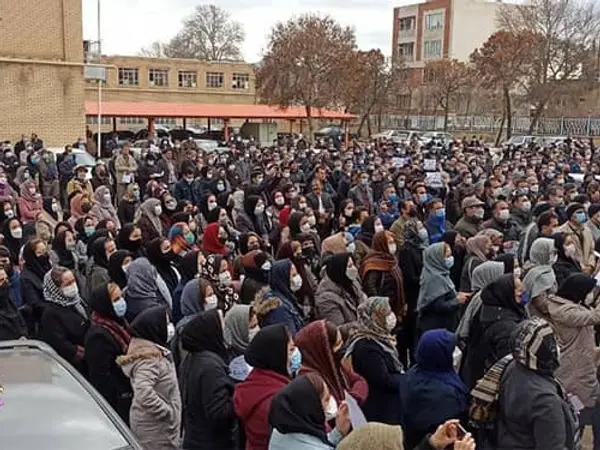The Islamic Republic has begun marking the 43rd anniversary of a revolution described by its founder, Ruhollah Khomeini, as the revolution of the "bare-footed".
For decades the Islamic Republic has celebrated what is known as Ten Days of Dawn (dah-ye fajr) which marks the ten-day period from Ayatollah Ruhollah Khomeini's arrival in Iran on the first of February 1979, to the day of the Islamic Revolution's victory, but this year's celebrations are marred not just by the pandemic but also the fact that it is much harder than ever to speak of the promises of freedom and prosperity given to masses in 1979.
Amid soaring poverty, a debate is raging among Iranians as to whether the revolution has failed in delivering on its promises. Many on social media and among activists in Iran point to government data that shows poverty has increased since 1979.
Khomeini always insisted that the revolution belonged to the mostaz'af, a Qur'anic word which means disempowered, oppressed, underprivileged, suppressed, or poor. He often used the word mostaz'af together with the "barefooted", "slum dwellers", and the "deprived". In his speeches he often said the Islamic Revolution was the revolution of "slum dwellers" against "palace dwellers" and could not survive without their support. Four decades later, however, poverty has not only persisted, but has been growing at a faster pace in recent years.
According to official figures released by the interior ministry, in total, around 60% of the 84 million Iranians live under the relative poverty line of whom between 20 to 30 million live in "absolute poverty". In 2010, for instance, the number of those living under the absolute poverty line was around 10 million according to government statistics.
Economic failures of the regime are becoming more and more difficult to justify, even given US sanctions. "The main reason for the [economic] problems [in the past ten years] is not just the sanctions. A major part of these were caused by wrong decisions and inefficiency," Supreme leader Ali Khamenei admitted in a speech Sunday.
Khamenei who charts the country's macro-policies, including the economy, takes no personal responsibility for the failures. Instead, in a speech last week he cast the blame for the troubles on President Ebrahim Raisi's predecessors, Hasan Rouhani and Mahmoud Ahmadinejad, and their governments.
Since 2017, Iran has seen several major protests fueled by economic demands rather than any specific political issue. The driving force of the unrest, including the nationwide November 2019 protests following an increase in fuel prices that left hundreds of protesters dead, and the 2021 water shortage protests in Khuzestan and Esfahan, were mainly the impoverished groups of the Iranian society rather than political groups and parties.
Even some of the most ardent supporters of the revolution and Khomeini's legacy are now questioning the outcome of the revolution. "One must ask, wouldn't much of the services [offered to the people] and the progress made happen anyway even if there was no Islamic Republic?", the Society of Combatant Clergy (Majma-e Rohaniyoun-e Mobarez), a reformist clerical group which is one of the oldest political groups in the country asked in a statement Sunday issued on the anniversary of the Revolution. "It is difficult to speak of the Islamic Revolution…and acclaiming it is even harder," said the statement.
The Combatant Clergy also warned that the Iranian society is now facing major economic, political, cultural and international crises including impoverishment and shrinking of the middle class. "People are saying forget about free water, electricity and cheap housing promised to us [by Khomeini and the revolutionaries], at least provide our most basic needs," the statement said.
The Combatant clerics who alleged that the Revolution has "deviated" from its original goals of providing freedom and prosperity to people also pointed out in their statement that anti-government protests are now more driven by economic demands than political reasons.
The allegation of deviation from revolutionary ideals of freedom and prosperity has angered the hardliners in power who find it very difficult to justify the various crises, including the crisis of poverty even by blaming the US sanctions.
Javan newspaper, affiliated with the Revolutionary Guards argued that when Khomeini said the 1979 Revolution was for the mostaz'af, he did not mean the economically poor but those who were "politically oppressed". "One can never say the roots of [the revolution] lay in the [demands of the economically impoverished] classes," Javan wrote.
